12th July 2023
The Spokesmen Cycling Podcast
EPISODE 334: From Bam-bu to Dott via Sustrans, Fettle, Flitbike and the Diagram Club
SPONSOR: Tern Bicycles
HOST: Carlton Reid
GUESTS: Dave Walker, Joana Saavedra, Ilma Barbaroviciute, Andy Lu, Alex Murray, Xavier Brice, Henri Moissinac
TOPICS: This is the third and final episode recorded from the Move mobility conference in London last month. Hear from cycling cartoonist Dave Walker, Joana Saavedra from the Bam-bu bicycle company from Portugal, two bike mechanic folks from Fettle, Alex Murray from Flitbike and Xavier Brice, the CEO of Sustrans. Plus, after the ad break, there’s a fireside chat with tech entrepreneur Henri Moissinac cofounder of the city share scooter and e-bike company Dott.
TRANSCRIPT:
Carlton Reid 0:12
Welcome to Episode 334 of the Spokesmen cycling podcast. This show was engineered on Wednesday 12th of June 2023.
David Bernstein 0:28
The spokesmen cycling roundtable podcast is brought to you by Tern bicycles. The good people at Tern are committed to building bikes that are useful enough to ride every day, and dependable enough to carry the people you love. In other words, they make the kind of bikes that they want to ride. Tern has e bikes for every type of rider. Whether you’re commuting, taking your kids to school or even carrying another adult, visit www.ternbicycles.com. That’s t e r n bicycles.com to learn more.
Carlton Reid 1:04
This is the third and final episode recorded from the Move mobility conference in London last month. I’m Carlton Reid and, if you listened to the first episode — with Councillor Emily Kerr — and the second one with a bunch of bike infrastructure folks you might have noticed a difference in the audio. With the magic of AI I removed all of the background hubbub from the interview with Emily, but left some in for the second one. Due to popular demand — well, a Twitter poll — I reduced the distracting show chatter by a few decibels but left enough so you could tell that I was recording in an expo hall, not a studio. And I’ve done the same for this episode’s interviews. You’ll hear from cycling cartoonist Dave Walker, Joana Saavedra from the bamboo bicycle company from Portugal, two bike mechanic folks from Fettle, Alex Murray from Flit bike and Xavier Brice, the CEO of Sustrans. After the ad break there are some extracts from a chat I had with tech entrepreneur Henri Moissinac cofounder of the city share scooter and Ebike company Dott. The background audio for that sounds different again because I was interviewing Henri in front of an audience from the show’s main stage. Anyway, kicking us off his Dave Walker. Well, fancy bumping into you here we haven’t met before day.
Dave Walker 2:45
So it’s good to be here.
Carlton Reid 2:48
Yeah. What the hell is is a world famous cycling cartoonist doing at this conference?
Dave Walker 2:58
Well, I’m here to learn, I guess really, in that. I, I normally spend my time shut away in my cartooning lair.
Carlton Reid 3:11
Away from the world. More you meet in real people now. Yes,
Dave Walker 3:15
yes. So it’s nice to be out of the house. So yes, I’m here to essentially I suppose I’m focusing on the micro mobility side of the, of the show. We call it a show, by the way.
Carlton Reid 3:31
Yeah, so it’s talking heads, and then a bunch of like, booths and stands on the outside. So ya know, it’s a show.
Dave Walker 3:40
So I’m here to go to some of the talks and maybe hear a few different perspectives. Because although I focus largely on cycling, I’m interested in sustainable transport generally. And so I’ve got one or two ideas bubbling up things I’ve heard already. And
Carlton Reid 4:01
because when we started talking before, you made a good point, and it is pretty obvious when you start going around even the bicycle elements of this show. It’s basically e elements, everything has got an electric element to it. And the industry is just clearly everything is got a battery now, and it hasn’t got a battery. It’s not innovative, and it’s not Yeah, it’s not going to be an individual conference like that. Is that a worry? Are we old in the tooth? Here we are.
Dave Walker 4:31
We are. But I suppose I can see the if you’re developing something new, then I suppose this is the kind of place you would you come to show off your new direction. And so maybe people who are doing things that are more conventional. This isn’t where you choose to come. But yes, it does seem to be the way things are going because of it that bikes tend to be moving towards having Moto as the standard,
Carlton Reid 5:03
yeah, so the reason I brought you to this particular part of the Startup Village, and the guy’s not here, because he’s Spanish, and he’s gone for a six hour lunch or whatever. But he’s Lane Patrol it so this is basically you’ll get a kick out of this, because he’s doing infrastructure. So it’s a cycling infrastructure. And so it’s of interest to you. And the reason the reason I brought you here is because it was so cute when I was talking to him, and he’s showing me his, his product on his laptop, up popped one of your cartoons, and it’s like, this is somebody in Spain. Yeah, opening up, he’s you. So you’re world famous. And I actually told him, I said, Dave is actually coming, I’m gonna bring him across to see how do you feel? Exactly. ,
Dave Walker 5:56
It’s unexpected that in a very small niche, at least, my work is, is known by people involved in the world of cycling and cycling infrastructure. In other countries, it’s yeah, it’s,
Carlton Reid 6:15
it’s, it doesn’t put, you know, Kit Kats on the table. There’s really no not necessarily. It’s building a profile to making money. Yes.
Dave Walker 6:28
And so you know, there’s a possibility that more people might buy a book, or might join my currently my diagram club is my way that I’m hoping to make a bit of a living from from what I do. So yeah, so it’s good that the works out there and let it’s being seen and enjoyed.
Carlton Reid 6:52
Hopefully he’ll come back and you can get to chat to him and you can probably invoice him. Literally, what’s his screensaver was one of your cartoons, which was which was a new you were coming into the show. So yeah, that was great. I’m, I freely admit that I will rip off cartoons, probably with a cycling element and private eye. And and put that on social media. And I, I probably wouldn’t do that with a photograph. But I saw I have no compunction to do that with a cartoon. Is that something that? Does that annoy you? Or is that just something that I know? It’s part and parcel of what you do as a cartoonist? And other cartoonists go through exactly the same thing? Yeah,
Dave Walker 7:29
I suppose. Yes, I suppose on the one hand, I see lives, probably a bit too short to get too annoyed about this, because it is just going to happen, people do enjoy funny images. And once they have a funny image, they will share it and use it themselves. But on the other hand, is somebody trying to make a living from it? You know, I’m always you know, it’s encouraging when somebody’s willing to pay for something. And so I suppose if somebody’s getting professional use, and if something particularly, and it’s helping them tell their story, get their point across, then, you know, I’d prefer to be
Carlton Reid 8:14
you’re cutting through the illustrations, you’re cutting through an awful lot of, of language and putting an illustration and that’s it then becomes much more visual, obviously. Yeah, but it cuts through the argument.
Dave Walker 8:26
Yeah. Well, that’s, that’s yeah, encouraging to hear, because that’s, that’s, that’s what I hope it will do. And, you know, using a little bit of humour, which I think is these days is a good way to make a point and something that we, you know, we we love the world of stand up. So humour is a useful tool. And that combined with having, you know, a little bit of knowledge of the experience of the world of cycling and
Carlton Reid 8:58
well, that shines through, you know, yeah, you absolutely have nailed a lot to it, which is why people share your stuff. So we’ve established that you are a global superstar. Certainly in Spain, you got a fan there in Spain. Where can we find your stuff? And where can we find out about the club where we can get tickets?
Dave Walker 9:18
So my website is Davewalker.com. So that’s where you’ll find everything that I do I try and link to from there, or I’m very active on Twitter, Instagram, where you can find by searching and but yes, I do. I’ve changed slightly the way I do things. So my cycling stuff originally was in books and the books are still available. One that’s slightly more sports focused and others more about getting just everyday getting from A to B. But as I was saying to you before the last eight Months. So I’ve been running something called diagram Club, which is where people who enjoy my work, pay a small fee and get reused the work in kind of nonprofit ways. Or cycling campaigns or local cycling campaigns will use it
Carlton Reid 10:19
so that they can use it without having the guilt of Oh, yeah, we shouldn’t
Dave Walker 10:24
leave it to people, you know, the, the price for this starts very low. And honestly, if people feel like they’re getting more use from it, then they can, they could pay me more money, which is, you know, obviously welcome. So, so yeah, so that was my way of allowing people who want to support what I do. So I have a way of doing so. And hopefully over time, that will grow and and there’ll be kind of new benefits to those who do join. And yeah, and they’re funding their funding new work, which so even yesterday, I spent the day working on something that wouldn’t really be possible were it not for for that so it’s a way of funding new cycling work that maybe wouldn’t have an immediate commercial backer.
Carlton Reid 11:14
Okay, brilliant. So who are you?
Joana Saavedra 11:16
So I’m Joana the co founder of bamboo bicycles.
Carlton Reid 11:21
What’s your second name?
Joana Saavedra 11:21
Saavedra.
Carlton Reid 11:24
Okay, and you have a co founder, Sorry, I interrupted you there. You’re the co founder of
Joana Saavedra 11:28
Bam-bu bicycles. So we are a Portuguese startup that is exploring bamboo as a natural fibre and natural composites and who are designing and building bamboo bike frames?
Carlton Reid 11:39
In Portugal?
Joana Saavedra 11:40
Yeah, so the frame is entirely made of bamboo, hemp fibre, and a BL based epoxy.
Carlton Reid 11:46
So there are very many brands. I mean, even in the 1880s, and 1890s. There were bamboo. And then there were forgotten. Yes. And then, you know, we’ve we’ve, we’ve got some today, and there’s like an African angle. So what’s what’s the angle of because our bicycle is actually it’s bam.bu? You Yeah. So what’s the angle? What what’s differentiating you? Yeah, from the few others not not a huge amount, but the other bamboo bike maker,
Joana Saavedra 12:13
basically, yeah, the first bamboo bikes that happened was in the UK really long time ago. But then the Industrial Revolution came, and then the natural materials just got forgotten, right. We do know that, you know, in the in Asia, in Africa, and even in Latin America, you have a lot of bamboo, you have a few bamboo constructions, even around in product development. But also bamboo is still seen as the poor material, you know, because it’s you have it’s in such abundance. And some of the companies are some of the startups that are doing a few things with Bumble in Europe, they either do workshops, or they sell you a kit. So you can do it at home, you make it yourself perfect, or they just import the frame. So while we want to do is to bring the know how of working with bamboo on a structural like in Europe, because there will be an industry of bamboo coming up soon, the bamboo plantations are coming up as well, in Portugal, in Spain, in France in Greece,
Carlton Reid 13:06
so where are you sourcing the bamboo from?
Joana Saavedra 13:08
Now it’s in in Indonesia, okay, so at this point is still in Indonesia, because the bamboo needs to be kind of in the right timing needs to be dried needs to be created. So you don’t really have that structure now in Europe, but we are now currently where that’s why we also were founders of the Burien bamboo Association. And our goal is to put the first level is to map the bamboo plantations that already exists in Portugal and Spain understand how long are they do they exist? What are the species for what are they used for so that we can explore ways of Okay, can we create an industry around product development or product design or more for construction or for recessed for textile, or something else? So we’re working with the University now in Lisbon, to do this mapping and to do this analysis of the species and we hope to continue that further to understand in which direction can the bamboo industry goes in Europe?
Carlton Reid 14:04
So potentially you could be growing it in Europe? Yes. So how old this bicycle which is now in front of us beautiful, beautiful bamboo bicycle, how old is the bamboo? What’s What are the age is that bamboo?
Joana Saavedra 14:17
So this bamboo will be always used, usually between three to five years old, okay. So after that, they will be good enough to cut to dry it and to then be used for for construction or for product development.
Carlton Reid 14:32
So in Europe, you can have that soon. Yes,
Joana Saavedra 14:36
yeah. So normally you have the rhizome needs to be developed first, right. So that will take two to three years first, and then the rest of the bamboo Yeah, will grow between three to five years. It really depends then on the species as well. And then as as long as you go, you can then just get it and it grows again. After three, five years. You have it again. That’s why bamboo is such a great one. ress because yeah it’s not a three they’d such a great a great a great plants for it because it’s besides that it regenerates the soil it’s really good for the gives nutritions to the to the soil is that after you plant it once it’s done then you can cut it because otherwise it will, it will dry while it’s there, it’s also not good. So you can edit you can use it for so many different things in the utilisations and then it grows again it’s a really beautiful it’s not a monoculture you can plant other things around and it’s a very magical as well forest normally when you plant them but so we really think it’s it’s important to see it as a as a potential for for restore as well. The nature then biodiversity as well then we can have
Carlton Reid 15:47
carbon composites Yeah, that’s basic plastic. Yeah, you’re writing a plastic bicycle? Yes, you can maybe recycle ish. Steel, okay, that’s a bit of a better material, titanium, these are all kind of like, non sustainable product really? Yes, material in many ways. Whereas of course, this is organic as in grow. Yeah. And you can literally replace it. And then if it breaks, you just basically I’m not saying it’s gonna break, but if it breaks you then that’s a product that can be okay, basically put in a cotton ball.
Joana Saavedra 16:23
Okay, yes. So normally a frame would definitely break because of the alignment of the fibres of the of the bamboo tubes, it could possibly crack. But if it cracks, you can fix it. But in the worst scenario, yeah, that if it breaks, you can either apply toilet and I don’t know, do some crafts or you know, out of it, or you can probably then burn it as well and transform it into biomass or something else.
Carlton Reid 16:51
Yep. So is there any lacquer on there? Is there anything on there that’s not eco that you need? Or can you say literally that’s just
Joana Saavedra 16:59
so the the resin that we’re using the epoxy, it’s a br based epoxy, so it’s not 100% Echo, but he has like around 60% echo on the rest and because it’s still you can for this type of structural that you need, you have to get that that part of it. So the epoxy is
Carlton Reid 17:18
just the joints, yes. Just the joints. Okay, so the rest is okay. Yes.
Joana Saavedra 17:23
And the joints are hemp fibre and epoxy, that is B of a step.
Carlton Reid 17:28
Right. Okay. And are you direct consumer? Do you think? Or will it be any bike shop?
Joana Saavedra 17:35
Okay, so up to now, and one of the reasons also why we’re here is we’re looking really to distributors or wholesalers in the UK. So we can have a representative here, our strategy in Portugal and also what we are looking is also to focus with in tourism and corporate for two reasons. One, to really promote sustainable tourism cycle tourism with a completely different bicycle riding and even inspire those persons that are not really used to cycle but they will be attracted to the bike because it’s a beautiful piece of design, and at the same time corporate so that you can really have corporate fleets for for staff. And we see those two reasons The best way as well to get to the b2c clients because people are still not really used to bamboo bicycles. So they will be you know, not very comfortable, probably not trust the material, you think about a cane, and you think is going to break. So we think that the best way to get to the final user and to gain their trust is through either tourism or corporate so that they could try the bicycle and really get comfortable and confident around the camera. How
Carlton Reid 18:44
much does this cost? How much the as the spec is here? Yeah. Yeah,
Joana Saavedra 18:52
we try as much as possible to use as well. Portuguese suppliers and industry. Yeah, this is Brooks. Then we also have here it’s TBird. We have Miranda on the crank set and we have Vaude so we try as well
Carlton Reid 19:05
to some noise kit, which is not gonna set me back. What’s that gonna cost?
Joana Saavedra 19:08
It starts in 2500 euros. Yep.
Carlton Reid 19:12
So that’s expensive.
Joana Saavedra 19:13
Yeah. For a made in Europe bicycle. Yes.
Carlton Reid 19:17
And because Portugal is actually coming up as a manufacturing nation of bicycles. Yes. So you aren’t you’re not like some strange? Yes, your niche Yeah. But Portugal is now becoming known. Yes. In the EU for making bikes. Yeah.
Joana Saavedra 19:33
So Portugal has this really old history as well or really known by bike brands right that were really built from scratch there. Then we started to to this level of we were really maybe one of the biggest assemble it so we really assemble a lot of the bicycles in in Portugal. So we probably designed but then we import the frames and all the components from Asia and we are assembling and now we are starting To see a bit of a shift, but until now, even a lot in terms of product development and prototyping is really not in Portugal. So it’s a little bit more outside. But now you’re starting to see and you do have one of the biggest some of the biggest as well, factories that are now starting to
Carlton Reid 20:20
visit. Yes, that’s all I know, it’s
Joana Saavedra 20:24
probably been to carbon, the carbon team and triangles, and some of them Yeah, so they are starting as well. And they’re, they’re building some of the frames. So we’re really want to shift to give the shift in terms of working with different materials, because we know that the industry is starting to talk about it now, like looking for natural fibres, how can we replace or at least combine some of the components will with some more of like natural fibres. So that’s a little bit our our goal here to just step up, we know that because we’re doing small production, because it’s still a different material, you cannot really just scale up or I cannot just go and subcontract to someone else to build it up. So of course, that makes that the product has a different level. Also, the choice of our components and brands made the bike as it is because we wanted something a little bit high end with really high quality, low maintenance so that you can have really a bicycle to be durable, as much as possible. Yeah,
Carlton Reid 21:25
sure. And what’s your background? So why are you
Joana Saavedra 21:30
okay, so I’ve studied economics, but I’ve been living abroad, I lived abroad for more than 11 years between Spain, Mexico, Holland, and China. So and that’s why six years in China got me closer and got me passionate about bamboo. And I found out bamboo I started like really researching about it, travelling around Asia as well to into some of the events around bamboo to get to know more about it. And my brother that is my co founder is an industrial designer, he had previously working with arbeta, that it was one of the big brands as well before in the bank industry in Portugal. So we just challenge ourselves. And we saw that no one in Portugal was working with them boom. In Europe, a very few persons were really working with bamboo in a structural way, or building their own brand or really trying to build their own friends here. So we really saw that there was really a space to evolve. And our dream is really to be a bit of the hub of innovation of bamboo in Europe, so that people can also come to us and try to understand how can we progress and collaborate with big brands in order to move in into the right direction? And so would
Carlton Reid 22:39
you say your your you were more bamboo? Bicycle? Yes. Yeah. But you’ve kind of educated yourself on the bicycle side because you’ve you’ve you’ve zeroed in Yeah, on the bicycle as something that can do something with bamboo as well. But bamboo first and bicycle second. Yes,
Joana Saavedra 22:56
bamboo first and then bicycle second. And then with a background of of the our industrial designer of Tiago that he was on the bike industry as well and are passionate of bikes. We really saw that there was really a match there.
Carlton Reid 23:13
And how long have you been going? So how new is this company?
Joana Saavedra 23:15
So we we’ve been going up like three years ago, I decided to move back from China to Portugal. And we launched this this models last year. So yeah, it’s been a baby with more or less two years.
Carlton Reid 23:28
And how is it going?
Joana Saavedra 23:30
It’s going good. It’s been the first time outside of Portugal really to present the brand and the project? I think, definitely the feedback here. It’s way more exponential than anymore. It’s you Well, I think the you know, in in Portugal, the markets in the mindset is completely different. For you know, urban cycling, we don’t really have that culture as well still. So here it’s been really, really interesting. And we’ve been approached for some big brands that are interested to collaborate so we’re really keen on seeing
Carlton Reid 24:01
big brands as in corporates rather than from bikes Yeah, because right now you have a referee now is Eurobike is happening yeah, that’s why we’re also there are you also you could have been there but yeah.
Joana Saavedra 24:14
Nobody the standard but we are that was a you you are industrial designers there Yeah, exactly. Right. That’s the goal. But we were
Carlton Reid 24:21
you could have exhibited there. Yeah, but you’ve come here instead. So that’s interesting.
Joana Saavedra 24:25
Yeah, but here was well it’s it’s in terms of like investment at this point. Right the standard it gets a bit of a in here we got invited to so we got the chance to have like split the team and be here as well to understand a bit the market and our goal was really to look for some partnerships on on the corporate world as well and to look for potential distributors or wholesalers so working to then tomorrow as well. We have a few meetings so that we can explore that way.
Carlton Reid 24:53
What do I know I wish you all the best with with getting more corporates to get on bamboo bicycles. Tell us how we can Get in touch so put it on tape your website or your socials how do we get in touch with you okay,
Joana Saavedra 25:05
so you can follow us on Instagram on bam-bu bicycles and so be I am bu Yes, exactly. And you can also check our website that is bam-bu how do you ash this yeah bambu-bicycles.com and follow as well subscribe our newsletter we always like get some either promotions or new product developments or we will let you know the next events are going to be in
Carlton Reid 25:36
Ilma, How do you pronounce that second name?
Ilma Barbaroviciute 25:39
It’s Barbaroviciute. Difficult.
Carlton Reid 25:44
Yeah. I’m glad you said that. They’re not me. A lot. What is this Fettle? Yes, is a bike because it Fettle isn’t like a northern English word. Yeah. For when I do an American podcast. And whenever I say the word Fettle Americans go northern English. It’s like, yeah, yeah. So I know what Fettle means. It means like, you know, repair something, but you tell me what it means in your context.
Ilma Barbaroviciute 26:13
Yeah, so Fettle is a fastest growing bike repair network in the UK. So at the moment, we have four workshops in London. And we recently opened the one in Bristol, we actually partnered up with quickfit, not long time ago. So two of our workshops are in quickfit locations. And we’re actually about to open the sixth one. And it’s going to be the third one, which in partnership with clixsense, basically. So yeah, so we do everything. Everything to do with bike repair, basically. So we don’t sell bikes, because we believe every single bike can be repaired. So you can bring your bike into our workshop, and we’re gonna fix it. And we also do a lot of fleet maintenance, We do manufacture partnerships, an important part of our business is making sure at the moment, it’s only affected in London, but making sure that people who commute to work, they do it on the same bike. So we a lot of our businesses, like b2b. So let’s say we go to the corporate and we maintain employees, bikes, and we also do workshops, or we people teach people how to maintain their own bikes, and all this sort of jazz. We have a lot of community rides, events as well. So it’s, it’s yeah, it’s a really white business.
Carlton Reid 27:33
So do mechanics. Are they all like Cytech? accredited? What? What is the accreditation that you’re using? Yeah, so
Ilma Barbaroviciute 27:39
all of our mechanics like in the workshops, obviously, we have mechanics and people who go and like teach people, they’re also mechanics. Yeah.
Carlton Reid 27:47
For that. Cytech. That’s, that’s what accreditation using? Yes. Yeah.
Ilma Barbaroviciute 27:51
I mean, I assume Cytech.
Andy Lu 27:54
Separately, Cytech. But there are other accreditation schemes out there such as Evans ran one on their own at some point. Yeah. And will will take into account, not just accreditation, but more importantly, experience. So certainly, you know, accreditation can only speak to a certain degree, if you don’t see the experience of the computer by versus, you know, the high end kind of an electronic race bikes. There’s certainly kind of gaps in between their accreditation doesn’t always,
Carlton Reid 28:26
I’ll tell you Cytech came from so Cytech was founded about 35 years ago, by a bike shop owner, it was it was basically the Association of Cycle Traders. Tell me stop me if if you know this history, and they went into this particular bike shop, went into a court case, yes. Where a bike had been fettled, of course, and the judge said, yes, very well. Shuttleworth was the guy Albert Shuttleworth. Sorry, I’ll dive in here. Quick fact check. It was actually Albert Shucksmith. And he died in 2001, a few years after the setting up of Cytech. Okay, back to myself getting a lecture at the Move conference. Very well. What’s your accreditation? Oh, we haven’t got one. Well, this case is now closed. If you haven’t got an accreditation, you’re an official trade body. Doesn’t matter how well experienced you are. Yes, I beat because the guy who said I’ve been doing bike mechanics for 30 years and the judge said, I don’t care. I want to see your accreditation. And he then went back to the association recycled traders and said look, yes, if we do not have accreditation, so they founded their own accreditation way ahead of the American industry, which is got all sorts of different weird ones. So accreditation is incredibly important to have. So that’s that’s where the question was coming from like, Yo, do you actually do If a customer comes in and gives you a very expensive buy, how do they know that? A it’s been handled by somebody who knows what they’re doing? And be they’re insured. They know that this bike has been battled correctly. Of course, you’re sorry. It’s your Andy. Okay, so Andy, I’m going to try and lean in my microphone as well. So are you partners in the business? What’s what is the what’s the how is the business formulated?
Andy Lu 30:29
What is the partnerships manager? And I’m the stock so I’m buying and purchasing manager in terms of what was your question? Sorry, the in terms of I was,
Carlton Reid 30:42
how big is the company? Has it formulated as a limited company? Is it all that kind of?
Andy Lu 30:47
Okay, so we are a limited company. We operate five workshops at the moment, three, sorry, for which are in London. We’ve recently opened a new workshop in Bristol. That’s our first workshop outside of London. And we are looking to expand very quickly with with the assistance of with partnership with Kwik Fit through their centre network. Through that through that can be
Carlton Reid 31:12
quite rapid. Yes, yeah. It could be like boom, boom, boom, on the on a sudden, you’ve got how many? How many stores do they have?
Andy Lu 31:17
So they’ve got around 650 or 600? Plus, I’ll say, and we started the partnership. Operationally, in April, I believe, we’ve already opened our first workshop in Bristol with the assistance and establish workshop is in our centre, we open that last night.
Carlton Reid 31:40
So they know or maybe you’re telling them this is a high cycling area. You should open it here whereas you could like some of them and outskirts of a city on the mainland where there’s no you don’t bother opening one there. Is that? Is that how you’re handling it? We would
Andy Lu 31:55
like we would prefer to say it’s more about priorities. So we will aim for the high traffic. I guess conurbation is first and then we’ll work towards I guess, belong outside of as as a trickle down to the tree
Carlton Reid 32:13
and talk about trickling down. Mechanics traditionally never used to get paid a huge amount bike mechanics I mean, scientific actually helped that because you get that you know, you have your level whatever money do you think federal could raise their game could raise it makes it a more of a career opportunity for somebody? Because there’s a career path you’re going through? Is that Is that something that you’ve considered? And they’re like, Yeah, we want to pay more money.
Andy Lu 32:43
That certainly was a, I believe a one of our vision part of our vision in the beginning. As we started, we started four years ago, I guess, just as the industry was starting to tail off before the pandemic, and then everything else happened. Part of our commitment to that was that we had sought a new way of participating in the London living wage. So our mechanics certainly were paid, what our paid above market rate at the time, and we are now starting to see that market rate is starting to catch up to us, which is great news for everyone, particularly the industry. And yeah, we certainly see that as we already are starting to see the arm mechanics as they kind of go on to other opportunities is that they are they are viewed as being of, shall we say higher quality because of their association with this.
Carlton Reid 33:37
Okay, brilliant. And what’s your second name?
Andy Lu 33:40
Lu. I’ll give you I’ll give you a card.
Carlton Reid 33:43
Because we got your name on tape and I won’t say it again. But we didn’t get your name. Thank you. Yeah, great stuff. Brilliant. Thank you. In fact, I’ve got your business card here so I actually put this on tape of fettle.cc people get in touch with you anybody who wants a job or wants to expand your empire happy Kwik Fit could be
Andy Lu 34:06
well at the moment it’s it’s an exclusive wellness exclusive partnership our network is our own we we own and operate our work our network so it’s not a kind of like a franchisee model we already doing it with Quick Fit as a as a partner.
Ilma Barbaroviciute 34:24
Yeah, that’s awesome. Yeah, and you can also follow us on social media. It’s at fettlebike everywhere. And we upload all the news about your workshops about community rights, community events, so people can join us, even if they’re beginners or even if they’re like advanced in their cycling journey. Everyone’s welcome.
Carlton Reid 34:43
Next up here is Alex Murray, of the folding ebike brand Flitbike. Right Alex? This is where we’re basically taking our lives into our hands here. We’re in the middle of the test track. Basically, people are going around on scooters at Move at Excel, but you in the middle are also allowing people to have a go. And this is this is version two iteration two of the Flitbike Yes, yes. So what’s different to this compared to previous version?
Alex Murray 35:14
so at flitbike we specialise in making lightweight folding electric bikes mainly for urban commuters so think of anyone who needs to take a train into a major city as part of their commute. A few years ago, we developed our first bike it was called the Flint 16. We manufactured hundreds of those sold them to people all across the UK and Europe. But then, as a common with a lot of companies in the bike industry, the supply crunch happened that lead time on welding factories went from two months up to about 18 months in some cases. And once you include getting all the components and shipping bikes over from Taiwan, and so on, lead times could go up to nearly two years. So we decided to go back to the drawing board got a grant from Innovate UK. And we use that to develop a whole new manufacturing method. So the bike you can see here has no welding on it whatsoever. It’s a non world bike, it uses the same adhesives that are used in the aerospace and automotive industries. So the bike is mechanically fixed together. And then we use industrial strength adhesives to put it together. Now, that’s not actually that new those techniques have been used since the 1980s. However, where it doesn’t necessarily make sense for a full size bike for a folding bike, it makes a lot of sense. Because if you’re working in aluminium, when you weld the frame, and then you do something called heat treatment to to refrain from the frame afterwards, you introduce distortions every time you do that. And by by not using welding, we don’t have any of those distortions. So it means we can be very accurate with how the parts fall together. That’s allowed us to get more compact. So this bike is about 20% more compact than our original version. And it’s also lighter, it’s about a kilo and a half later.
Carlton Reid 36:54
So the Brompton and many other bike having like a removable battery pack on the front or wherever. So Where’s where’s the battery on this? Where’s everything hidden? And how do you recharge it?
Alex Murray 37:05
Sure thing? Yeah, so the Brompton fantastic bikes, when they came to making an electric folding bike, they didn’t want to change the design too much. So they essentially sort of retrofits, a lot of the components onto the bike motor goes in the front wheel, the battery clips on to the front, as you say, we started from a blank piece of paper, which meant we could put things where we wanted. So the battery frost lives in the top tube here. And it’s got the charging port there on the side. So it can all be charged. The battery is removable as well. So if I just take the seat posts out, appreciate your listeners won’t be able to see this, but the battery slides out there. Right. And that’s a custom a battery that lives in the top tube with an integrated real I
Carlton Reid 37:44
was gonna say there’s a there’s an LED at the back there as well. And there’s there’s something at the front as well. Yes. So we have on the front, though. Yeah. You mean speaking of mono blade as well. So there’s like no, Mike Burrows influence? Yes. Rip, Mike.
Alex Murray 38:00
It’s been sorted by us. So we’ve just had our patent fully granted across the European Union, which is I mean, main market, the UK and European Union, I should say. So that patents have been granted, it’s a unique fold that. Okay, so folding bikes have been around for a very long time, 100 years at least. So there’s very little new under the sun. However, not many people have been designing folding bikes with lithium ion batteries integrated into them that’s quite new. So the way this bike folds, you would only do it if you get a battery that was small and light enough from the lithium ion technology to fit inside the bike. So uses a unique fold that uses an offset headset and an angled fork hinge to bring the front wheel to the side. So you mentioned Brompton earlier. So I’ll just use them as a reference point, Brompton achieved something similar, but they use a hinge on the top tube. It’s a great design. But if you want to put a battery in the top tube, it’s not going to work. So this is a this fold is patented, and has been through the examination process and everything
Carlton Reid 39:02
is going to set me back if I’m going into a shop or if I’m buying direct, I’m gonna tell me the two parts that question and where do you buy it? And how much does it cost?
Alex 39:09
Sure, sure. So at the minute, we’re direct consumer only, so you can buy them from us. We have partnerships lined up with shops in the UK, but we’re going to be launching that in a in a later phase. So at the minute, it’s just from us, the full retail price of the bike is two and a half 1000 pounds, which is alright, which is okay for folding, folding ebike, particularly in the premium category. But because we’re doing pre orders at the minutes, people are ordering them in advance, it’s actually 2000 pounds. When you add on top of that, that most people are buying through cycle to work, the price can drop another 40% or so. So we think we’re pretty well priced.
Carlton Reid 39:44
And Alex tell me where we can learn more about Flitbike, your website and your socials.
Alex Murray 39:51
Sure thing so we’re we’re to be found online at www.flit.bike and then to find this bike in particular, it’s flit.bike/m2, and on social sites, Facebook, Instagram and Twitter, we’re at flitbike
Carlton Reid 40:06
So, Xavier it’s just tech, tech, tech at the Move conference. It’s e scooters, its autonomous vehicles, lorries that emit only water, not spewing out. awful stuff back there. So the thing that’s missing is shanks’ pony, is pavements, because you’ve been given a talk here. And you were talking about how we move. Yeah, and how we show some slides of dystopias and other words, those kind of motor centric cities of the future where almost walking isn’t in Wheeling and wheelchairs, can I just almost not there or you know, why really separate? See, you are the opposite to everything that’s here. Are you here as some sort of agent provocateur?
Xavier Brice 41:05
Well, to a certain extent, I mean, that’s just this conference is called Move. So it’s about movement. And my argument was, movement is one of the fundamental things that makes us human, that shape. And therefore how we move is a fundamental question about how we want to live together. And I don’t think that, that were the kind of opposite of all of this. I mean, there’s some practical stuff isn’t there isn’t much money to be made from walking and pavements. And this is a conference with exhibitors. And as you know, there’s a commercial side to it, which needs to be recognised. And I think that’s just commercial reality. Not that there’s not much money in active travel. So and so I think that that impart shapes what you’re seeing here. And the other thing to say is that transport technology, transport innovation, a lot of what you see here, there is nothing wrong with it, per se, there is nothing wrong, per se with the car, it’s often the unintended consequences. And so I think that highlighting the unintended consequences, talking about those and reminding people that ultimately just as transporter derived demand, transport technology is is serving a purpose, which is to connect us to move us. And actually, we need to go back to the question of, of not only how do we want to get from A to be as quickly as possible, but how do we want to live? How do we want to be together? How do we want to move together? And given that movement as an opportunity for human connection? How can we maximise that, while still enabling people to have convenient, comfortable journeys, that in a way that helps bring us together helps us be the society we want to be, rather than pushing us apart.
Carlton Reid 42:52
So you’re talking about connected connections you have when you when you walk into, potentially, when you when you start community, you can’t just stop on a dime, and talk to somebody which you tend not to be able to do in a car. And you showed one slide, which is the famous study of Sheffield, where a great grandfather, you know, as an eight year old, had eight mile radius, coming right down to the modern generation of that family 300 yards away from a house. And you mentioned that your total right now that’s probably even less than that. And the other study, you could have mentioned, you will be familiar with the Appleyard study, which is the amount of connections you’ve got across the street, across, you know, we’ve got cars coming here, then where’s people you can get people go at different angles on there’s no cars, basically. And that’s also something to do with with a human connection? Absolutely. So that’s something that we’re losing. And you’re what you said in your talk is what we travel in teleporters when travelling to get places as fast as possible, whereas that for our mental health? And for many other reasons, that’s probably not the most optimum thing to do.
Xavier Brice 44:08
No, indeed. And so it’s always the danger, isn’t it? When you optimise for one thing, you optimise for that one thing, and therefore you will have unintended consequences. And so to go back to that notion of human connections, the point I was making there was so when I used to want my daughters to school because the school was close enough to the house to do that. And during that walk, I would always see somebody I knew. And I knew them probably through I might have met them on the walk to school Bachalo and got chatting and and that’s making a human bond. And it’s non trivial. There’s lots of evidence don’t trust is built over time, not in single big acts. So So community trust is built through those social bonds. I talked about you know, when you drive I do drive, and I now drive my children to the station on a fairly regular basis has been safe enough to cycle sample Okay. When I when you do that, literally anyone you come across That’s like going the other way. See, anyone else you come across from the road is in your way somebody crossing is slowing you down the car in front of you, it wasn’t there. You could go faster if they’re not speeding,
Carlton Reid 45:16
or you try to sorry, you’re trying to stop yourself from thinking that or you are thinking that when you’re driving, you know, this is the impulse is
Xavier Brice 45:23
the impulse, isn’t it? Because because when you get enough factors as people are in your way, so I was at an event that we already see foundation about the future of the car. And Richard Hammond was one of the talkers who was being provocative on you, standardly. And he was talking about him, the goal is to get somewhere and ideally get somewhere quicker than someone else was his words. No, that’s an exaggeration of it. But there is something about it’s that notion, is that famous thing of people complaining about the traffic, not recognising that part of the traffic. We all do it. Yeah. It’s the nature of being enclosed in your own personal mobility device, your own teleport. And I think that and beyond that, go back to what you were saying about. That’s the Appleyard study. So So increasingly, car travel is about door to door. So one of the things I talked about was the scourge of pavement parking, a huge impact that has on disabled people in particular. And it seems again, like a minor thing. But it’s huge, actually. And, and one of the reasons I think this come about is more than one reason. One is certainly the increase in private car ownership I saw you on Twitter tweeting about recently, so that there are simply more cars and less space. But one of the things that I regularly see, matching UDT is actually where there are perfectly sensible places to park, people are not parking there, because it’s not directly outside where they want to go. And what seems to have happened is, there’s a sort of a view that it’s not my right to park outside my destination. So this notion of the car is sort of pseudo teleporter is becoming more and more the case, if you think about from autonomous vehicles, especially when you summon up on your phone, you are getting close to teleportation, you are getting close to this ideal of, you know, I tap on my phone, my pod arrives, I get it, I get to my destination, I have no contact with anyone on the outside world bank on that amazingly convenient. And living in suburban Surrey with children who do after school activities, but very limited safe cycling infrastructure, and an adequate bus service. You know, I know how much time gets spent preparing children about oh, my goodness, the thought of being able to put them in an autonomous pod. You know, let’s face it, that is a that is that would that would improve quality of life, but at what cost? At what cost of their own sense. And and and it’s not one cost of the society we’re building. And if you think about some of the images I showed, and poked fun at which were these kind of tech visions of a tech enabled transport future, you just want to step back from and say, well actually focus on looks amazingly convenient. But where did it take us? Does it take us somewhere that we actually want to live, that we actually want to build communities in that we want to know where chip where our children will be able to play where our children will learn their independence. And those things are really important, especially in an increasingly polarised world. And especially with the public health crisis that we have, and we’re storing up for the future, where actually, movement is good for us encountering people who are different than us, is good for us building community partners. And actually, a lot of the way we do that, it’s not at a destination. It’s getting an axe on the way there, it’s leaving our door and walking to the bus stop. It’s it’s those so on the way here today, actually the railway station, I bumped into somebody you I haven’t spoken to for years, and we caught up. And it helps it made me happy actually, then it helps increase our social capital. And these are not trivial things.
Carlton Reid 48:57
You mentioned, not trivial things you mentioned. polarised world. Yeah. And in your talk, you mentioned that there are some LTNs that are brought in at breakneck speed potentially, that’s where some of the friction has come from. But then you predicted that the going forward. Some of the conspiracy theories around LTNs, around 15 minute cities is not going to go away could potentially even increase. Is that Is that a fair reflection of where you’re going with that?
Xavier Brice 49:37
I think it’s not comforting thought as a but I think I think when you when you look at the challenges around climate change, to rail on what those elite into and if you look, you know, the US is often ahead of the UK on many things. It’s a predictor of what’s to come. And there’s I Let us for several years in the early 2000s. And I think if I was to go back, it would feel very different. Certainly talking to people who live in the States, you know, and clearly and and, and you look across mainland Europe that’s on the rise advisor far right parties as well as far left. So I think I think it’s difficult to say that on one side lightsaber, we’re not going to polarisation is going to go away, the conspiracy theories are going to go away evidence or evidence of that. And in things that get taken into the orbit of different conspiracy theories, right, going back to what I talked about movement movements are fundamental human part fundamentally being human. And it’s where conflict occurs, because it’s where we come together. And movement and transport is often it’s one of those social dilemmas that isn’t, you know, it’s by maximising what we own personal gain my own personal mobility, my own personal convenience, can act against the greater good as good of a hole, which ultimately will come back and bite me traffic. And so I think it’s no surprise that transport finds itself in the crosshairs. Especially when, where people will live. And it also is, again, deliberately pulled in in some areas. So So I think it’s not going to go away. And and it’s not just climate change, because because a lot of what some of what we’re talking about, you know, you replace cars with electric cars, or Can’t you imagine, if you were able to snap your fingers and replace all cars and electric cars tomorrow, choice is impossible. You would still have challenges around LTNs, you will still have issues around traffic, traffic, destruction, people, all the stuff. We haven’t even talked about emissions yet. So I don’t think that the electrification we see around us here today and what’s going on is really needed is a good thing. That’s not going to solve some of the fundament fundamental dilemmas and transport which actually is what makes it so fascinating, so interesting. And so worth influencing living has changed for the better.
Carlton Reid 51:55
Thanks to Sustrans’ CEO Xavier Brice. Next up is Henri Moissinac, co founder of Dott. But first let’s go across to my colleague, David for a short ad break.
David Bernstein 52:05
Hello, everyone. This is David from the Fredcast. And of course, the spokesmen. And I’m here once again to tell you that this podcast is brought to you by Tern bicycles, the good people at Tern build bikes that make it easier for you to replace car trips with bike trips. Part of that is being committed to designing useful bikes that are also fun to ride. But an even greater priority for Tern, is to make sure that your ride is safe, and worryfree. And that’s why Tern works with industry leading third party testing labs like E FB, E, and builds its bikes around Bosch ebike systems which are UL certified for both electric and fire safety. So before you even zip off on your Tern, fully loaded, and perhaps with a loved one behind, you can be sure that the bike has been tested to handle the extra stresses on the frame, and the rigours of the road. For more information, visit www.ternbicycles.com to learn more. And now, back to the Spokesmen.
Carlton Reid 53:15
Thanks, David. And we are back with audio from the Move mobility conference. I was one of the interviewers on the shows main stage and I snuck on my microphones so I could record my fireside chat with Henri Moissinac of the city share scooter and ebike company Dott
Move announcer 53:33
Up on stage for our next session Carlton Reid and Henri Moissinac.
Carlton Reid 53:41
Good morning, we are miked up, and we are ready to go. So I am here this morning with Henri Moissinac. You live in London, Henri. So we’re gonna be talking in a minute, about 15 minutes cities. And if you’re aware of all the conspiracy theories, around 15 minute minute cities, we’re going to not try and go down into that particular rabbit hole, we are going to try and keep it all positive. Neither of us are in the pay of the World Economic Forum. Let’s just put that out there at the moment. But first of all, before we get into the the absolute gubbins of what we’re gonna be doing here this morning, Henri. Let’s find a little bit about you. Because you’re with Dott, we’ll get into the biography of Dott in a moment, but let’s get a biography of you. So tell us about your background because he started in E commerce. And even in social networking, both of these things before they became big. So give us your your biography, and then we’ll get into Dott.
Henri Moissinac 54:54
is great question. So yeah, actually, I started in E commerce. It makes me think about mobile because when I started in E commerce CES was like, three, four years before it started become becoming popular. And I remember vividly people were telling me is just never going to work, you know, people are never going to put their credit card on the internet. And some of the things we did, and some of the companies that work for became massive, massive successes, and there were hundreds and hundreds of millions of users. I was just saying, when I started in social networking, so I was an early employee at Facebook, we have 300 employees. And when I joined Facebook, people were telling me, it’s never going to work, you know, people, you’re only going to see photos of cats and dogs on the internet. Look how many users now. And I, to me, mobility was made the same way I started getting interested in shared mobility. And people were telling me you’re never going to work here. I think what we see here with the move, you know, if you look how much progress from the first one in 2019, to today, look how vibrant this industry is becoming. So I think it’s going to be the same, like E commerce like social networking. Some of the other things you’ve seen massive changes, I think shared mobility or micro mobility, these type of things that you see behind is going to be become very popular. And the one who’s going to disappear as the personal income within cities. Yes.
Carlton Reid 56:12
Now let’s go into Dott. How did you get into dott and describe how dott has not just shade scooters, it also has a n ebike. So described the trajectory of Dott. started in France? Yes, in Paris.
Henri Moissinac 56:29
Yeah. So maybe just a few words about that. And how do we stop this so that we operate in at 60,000 vehicles, about 1/3 of this is E bikes, and the other the rest of it is e scooters. We are in 35 cities in Europe, and most of the main cities in West Europe. So London, Paris, Brussels, Milan, Rome, Walsall Madrid, we also in Tel Aviv and surroundings. And then we operate plenty of smaller cities in in Belgium, France, Italy, bit of UK a bit of Spain. When I started when I was actually on a refreshing trip in China, I wanted to take a personal break and go through the bucket list. So I went to China because I wanted to see how vibrant and how China was not not the tourist year aspect of it, but you’re spending time with entrepreneurs and so on. And so this wave of shared bags, mobile microphone, you may have heard of these companies. And then we also heard about the stories about bird coming up with a new form factor. And so Maxine microfauna. And I, we took a piece of paper and we say, okay, what are all the things we like, of the of the things we’re going to copy? What are all the things we don’t like? And we are going to do none of that. So for example, the gig economy of birth, we said none of that for us. And then the last question was, what are all the things neither Chinese or American will understand? And that’s typically the relationship with the cities and the stakeholders. And so we thought, okay, well, if we do very well, what they’re good at if we avoid all the things we don’t like, and if we do think that neither the Chinese or the Americans can understand, we have a chance to win. So that started, we were probably the last company to start, I mean, among the big players, everybody thought we would have zero chance against realignment and burnin look where we are today. And we are very healthy, we are going very fast. We feel very safe about the future of this industry. So yeah, it was That’s how it’s happened.
Carlton Reid 58:30
So we are gonna get on to 15 minute cities. But let’s dig a little bit more down into into Dott. You the bikes came on after that the scooters. So I’d be interested and I’d be interested for you to tell the audience about the share between bikes now and scooters. And does that change compared to the way the city is and what they’re on the ground would have seen for instance, bike lanes now.
Henri Moissinac 58:57
So first, let’s step back and understand what’s the vision and strategy and then how they compare to each other today. So the vision is we want to go after every trip that is not walking in public transit. But when we are younger and we only have a piece of paper and a few doors, you got to be a bit naive and optimistic and you got to start simple and be very focused. So we thought that scooters would be the form factor to start with. We know all the data proves it today scooters are a bit edgy gives you more freedom for you feel younger, it’s you know typically a bit more male and female a bit younger than the typical average citizen of a city. So we thought okay, let’s just scooters when we got it right in many cities, we stopped bikes. And also we wanted to wait a bit to see what type of share bikes we could come up with because we felt the early pieces of hardware weren’t going to be sustainable enough. So now in most capital cities, London we operate in London for example, we are both in Paris processes on the bikes. They are typically older and more female They are they go a bit faster. So to be key commuters, they tend to like it a bit more. When it’s cold people prefer to do bikes. But when it rains, people prefer to do scooters. And typically we have three types of users. We have people who are heavily on scooters, and they love it. And it’s just a lifestyle for them. And they don’t want to touch a bike. We have people are more pragmatic like me, that will just switch depending on availability, the weather where they going, if they know traffic or not. And then we have people that just don’t want to touch the scooter and they will never get on one and the only comfortable on bikes. So that’s why you need to get to both.
Carlton Reid 1:00:35
And the bikes that the bikes so they’re limited in their speed. But on downhill sections for instance, you’re not limited you can go as fast as you like on on. The scooter, of course, is limited. So why why do cities? Why does the industry that the sector limit one mode doesn’t mean the other mode because of course motorists are not limited.
Henri Moissinac 1:00:59
Yeah. So for remediation facts first, answer your question. So typically in cities the bikes I’ve sold our bikes are kept in speeder same for scooters. And in some cities, most cities, the bikes have a slight senior higher speed cat again, then in scooters. But then there are sometimes bigger differences. For example, in London with a bike on that you can go through a park, but you can’t do it on the scooter. Either backing walls also can change. So in take, for example, in Paris, when the gap is the most important. So these like 10,000 parking spots for bikes, and only 2500 parking spots for for scooters. So it doesn’t really give it exactly the same experience. I think it is. The reason for that is because scooters is new and bikes is not enough stakeholders have decided to limit the speed, I think actually the speed of a scooter is is quite good. I mean, it really goes well. It’s not too fast. It’s not too slow. And London is the only city where it’s slightly lower than the other cities. And then the bikes they are they can go faster, but they don’t go at the speed of a personal bike. Most of the personal bikes, too, as we share bikes, the speed of our bikes is designed so that if you ride in a bike lane with Santa the bikes, for example, you’re going to be in the flow, you’re not really you can pass but you’re not going to disturb everybody. So not too, not too slow, and not too fast.
Carlton Reid 1:02:26
15 minute cities, which is the conspiratorial thing of the moment. But it’s a very, very nice concept you would think, to live close to education, to shops, to nice restaurants. Why on earth would that be subject to a conspiracy theory? It’s quite strange. However, Carlos Moreno, who is the guy who came up with concept in Paris called Paris. He describes it as something there, the proximity to all of these amenities is mainly by foot. So a bicycle or share bike or by standard bicycle or a scooter actually extends that to not being a 15 minute stick, because you can get quite a long way on a scooter on a bike compared to the walking 15 minutes city. So do we still talk about a 15 minute city when we’ve got a bicycle or a scooter involved?
Henri Moissinac 1:03:27
So the concept of 15 minute cities is it’s really a vision I I follow and I believe a lot when these type of messages came from not just parents actually your loved cities, I think you at least London is the perfect example of this vibrant neighbourhoods, young there. But yeah, you’re right, your job, your university, maybe your next job interview or your friends, they’re not going to be 15 minutes walking away, but would be great if they could be 15 minutes with public transit or your personal bike or a shared bike and you can do quite a long distance and 15 minutes on the dots whether it’s a scooter or bike, so it just widens the possible network. So I don’t know why they didn’t just take an example. If you in Piccadilly Circus, you know centre of London, it takes to go to the other side of Hyde Park, it’s about 18 minutes with with Russia bike, it will take a lot longer in public transit. And yeah, so if you have your personal bank, if it hasn’t been stolen, you can go even faster. So I do believe that micro Rutaceae scooters, share bikes private bikes, they help you live within 15 minutes but just increases dramatically the rich the distance you can get them. The average distance in Paris for example, I’m just French so use that example. The average distance in Paris about three kilometre for us and it So completely when we talk to people the price in terms people are not in the industry doesn’t matter. They, it’s very hard for them to realise exactly what tricky matter because that’s not how they think. So you tell them when it’s about 2500, for now, in metro or in Cuba, by the time you get there maybe and if the connections 45 minutes. And so that’s how people think. And if you’re telling them 45 minute trip with one connection, now you can do in 20 minutes on a shared service. I mean, I’m going to see my friends, I may take a job that is further, I may have this other business meeting and business relationship face to face that wasn’t able to do so. So I really believe we are bringing good here
Carlton Reid 1:05:41
I got here from Kings Cross on a folding bike. And most of the way it’s on CS3, which is the cycle, superhighway three, which is great. But then there’s one little bit. The last, basically, last mile, in fact, is not on bike paths, and you’re on a road. But there was no cars on that road. And all of a sudden, what would have been quite an awful journey. If there are 1000s of cars on that particular busy, what would normally be think a busy stretch of road suddenly became this is great, because there are no cars or no trucks. And so I can now go on what in effect was like a dual carriageway motorway quite happily. So is that the future for cities because cities like London, you know, private motor cars are disappearing. Paris and Hidalgo with all her content, are also trying to get rid of parking spaces trying to get rid of cars. So is the future for cities going to be? It’s not the bike lanes, it’s going to be there are no cars around. And it’ll be the scooters, the bikes, the private banks, the private scooters, that’s going to take over and you’re not going to have to build bike paths. You’ve got the existing infrastructure or these beautiful roads. It’s
Henri Moissinac 1:07:02
probably the hardest question for the stakeholders and cities because they have all these conflicting messages and so on. But the reality is that a city needs infrastructure, it needs logistics, it means delivery trucks, your restaurants will be able to serve you pizza in the evening, if there is not a delivery truck in the morning, so you’re still going to have motor vehicles. And some of them are quite big to, to, for example, the delivery people. And how do you combine all these modes, the one thing I think most cities are clear on is the private ownership of cars to do small trips within cities. That doesn’t make sense. And we’ve been living for 30 years. And that’s the transition were doing it reminds them you’re talking about ecommerce is the same transition of I go to someplace to do some shopping, because I don’t I can’t just have it delivered. Or if you take, for example, email, I had to send faxes in the past and I can read over that transition takes time. But I think this transition, how they’re going to rethink the centre of cities, it’s moving really fast. I’ve been in London for 10 years, if you look at embankment used to be a kind of highway, and now look how much better so that was for sure is that to really get mobility to change, you need to have safe paths for for for people to be comfortable on their private bike or shared services. That’s really important. And so that’s why most of the time, the primary better is to get safe space. And just specifically the intersections are healthier for pedestrians and for shared services. I agree with
Carlton Reid 1:08:39
the safe space. But kind of circling back on that question. Just if you get rid of the colours, you have got that safe space. So that’s not an easy win for a legislator, get rid of the cars. Why can’t cities just get rid of the cartels?
Henri Moissinac 1:08:57
It’s really interesting to see the conflict between the stakeholders within one city so I do have a lot of respect. Take Take London for example. The people in London that built the bike lanes, they’re really Crusaders, you know, they are really trying and good for the city. But every time there is a project for a bank lien is plenty of opposition’s takes forever to convince the local residents that removing parking spots. Because if you if you remove the parking lane, you know, like it is like 50 cows that are sitting there forever moving maybe once a day, at best at best. Just move that to a bank then think about all the people that could benefit from the space. So it sounds obvious, but it seems to be extremely difficult to do. And I think it’s really important to have statistic owners are thinking about the long term and not the short and the long term is having a personal car parked in the street, not movie when you can remove dance and do a bank pain or delivery spot inside the parking spot for deliveries. So obviously they just do it.
Carlton Reid 1:10:00
Why don’t you talk before about shopping in with a scooter or with a bank, you can’t carry a sofa, you can carry lots of heavy shopping, for instance, if you do a weekly shop, so the private car still as van, that perfection, you can carry lots of stuff. So, you know, do you argue that we should get rid of cars? Because cars are actually quite useful? Maybe only sometimes, but they’re still useful. So can you argue them? So I’m basically I’m being a devil’s advocate here. So can we argue for getting rid of cars when they’re actually incredibly useful?
Henri Moissinac 1:10:41
People will adapt their usages there will always be a need for cars, for example, if you have kids, or if your luggage if you’re going very far away, I’m not saying the opposite. Yeah. And I’m thinking a lot of the things can be adapted. And the the average consumer does change their habits. You were talking about shopping on the bike and scooter, it works very well. And I mean, the best training course is EasyJet, you know, think of all the people that used to have luggage, big luggage and so on. Amanda just had a backpack. Thank you EasyJet, for training us to have a small backpack, you have your pay for luggage, the same if I spent a lot of time in the streets with users and so on. A lot of them start to carry the backpack, love them. You go to dinner or sample class, you see them they come out of the train and the hub they go off on the shuttle service, but he can’t zone the zone carrier tray anymore. They have a backpack? So yes, he I mean, life is full of possibilities. And people want to enjoy it as much as possible. You give them mobility, they do more things. And yes, if they need to carry a say I will say the bigger backpack because they want to do that. And I’m not worried. We are about creating opportunities for people.
Carlton Reid 1:11:52
Henri, thank you very much if we could give Henri Moissinac round of applause. Thank you.
Thank you and thanks to all my guests today. And thanks to you for listening to Episode 334 of the spokesmen podcast brought to you in association with Tern bicycles. Shownotes and more can be found at the-spokesmen.com. The next episode will feature two Swiss academics talking about a new report on the growth of cargo bikes. That’ll be out next week. Meanwhile, get out there and ride…
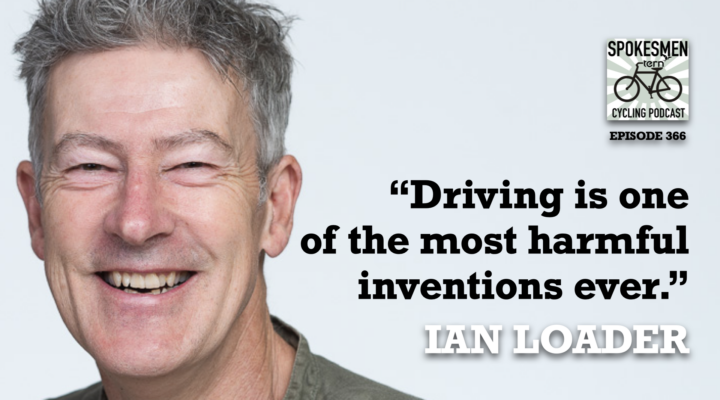
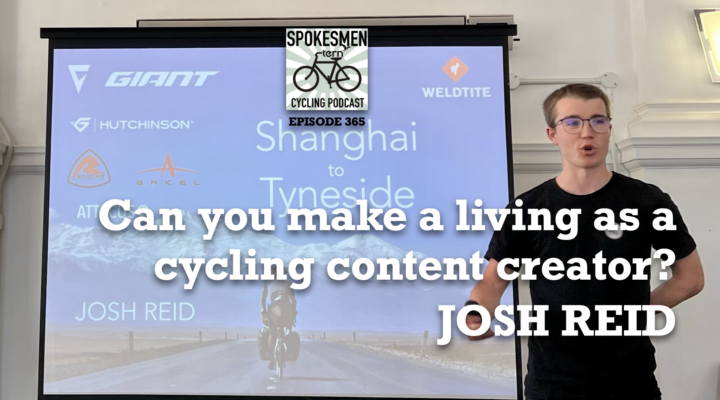
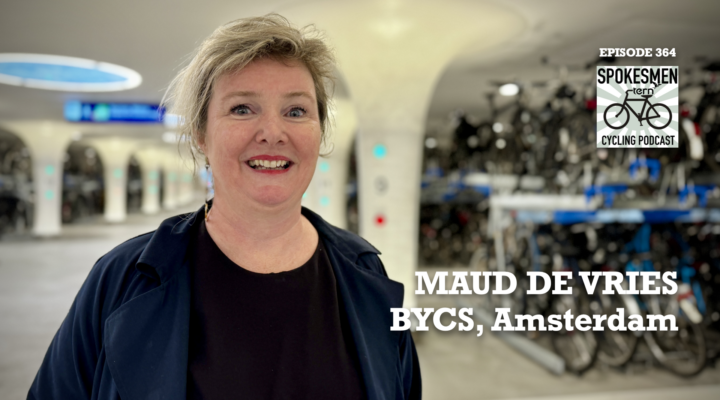
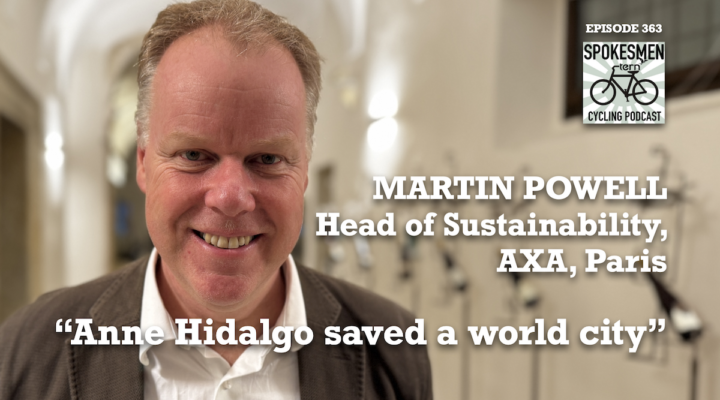
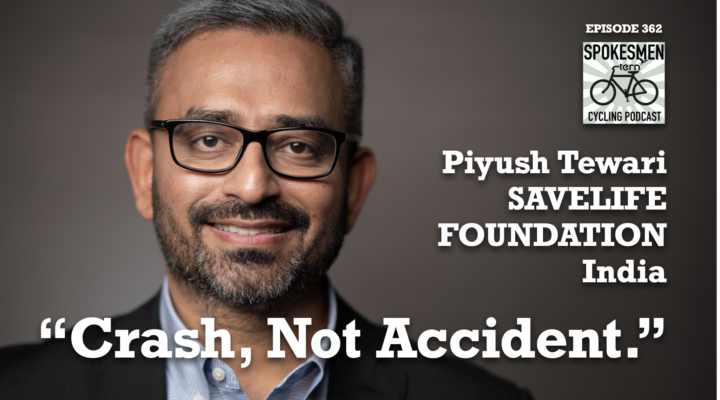
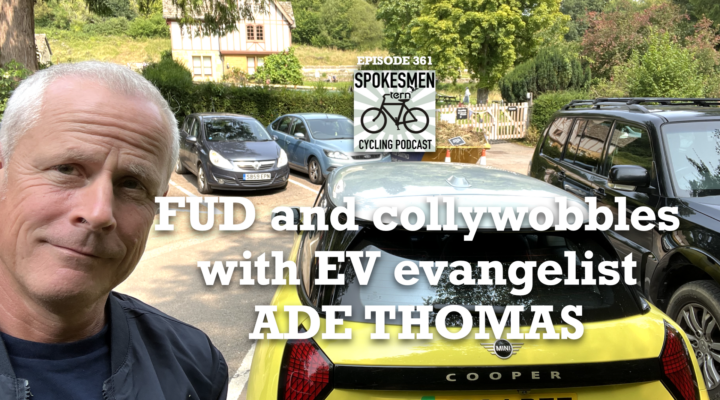
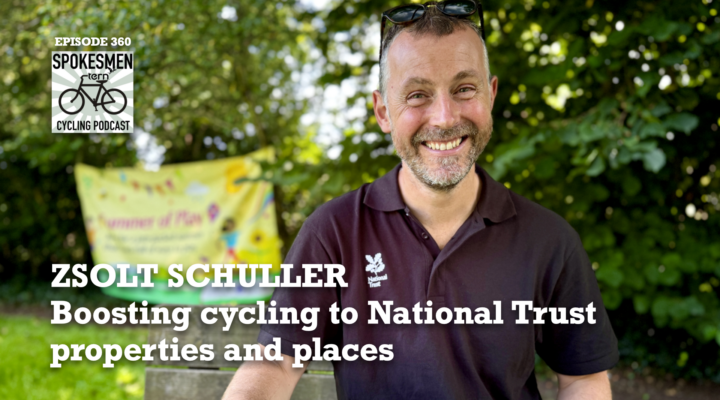
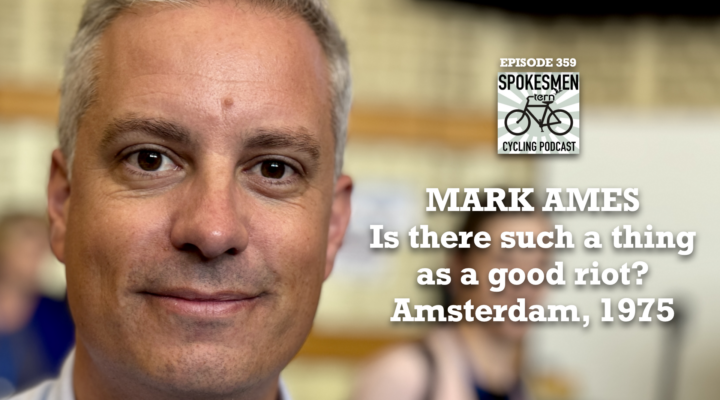
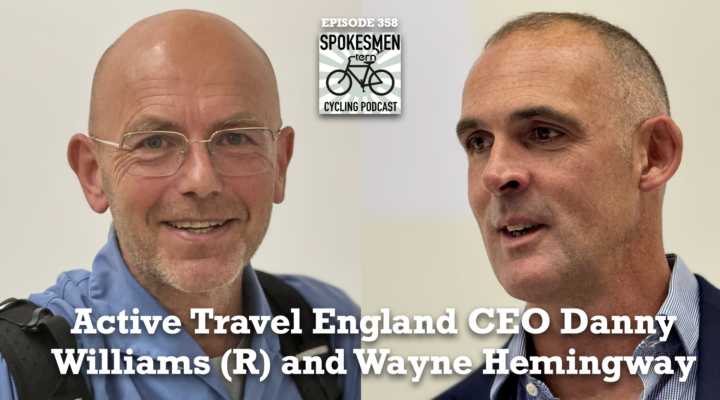
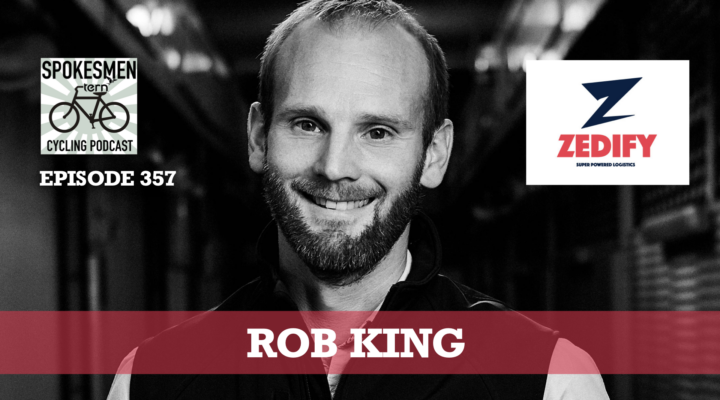
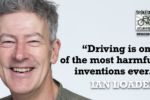
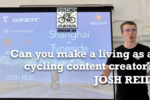

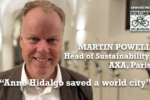
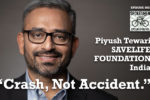
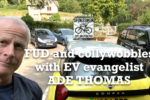

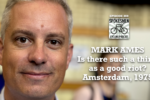
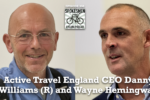
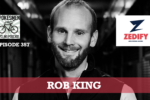
Be First to Comment